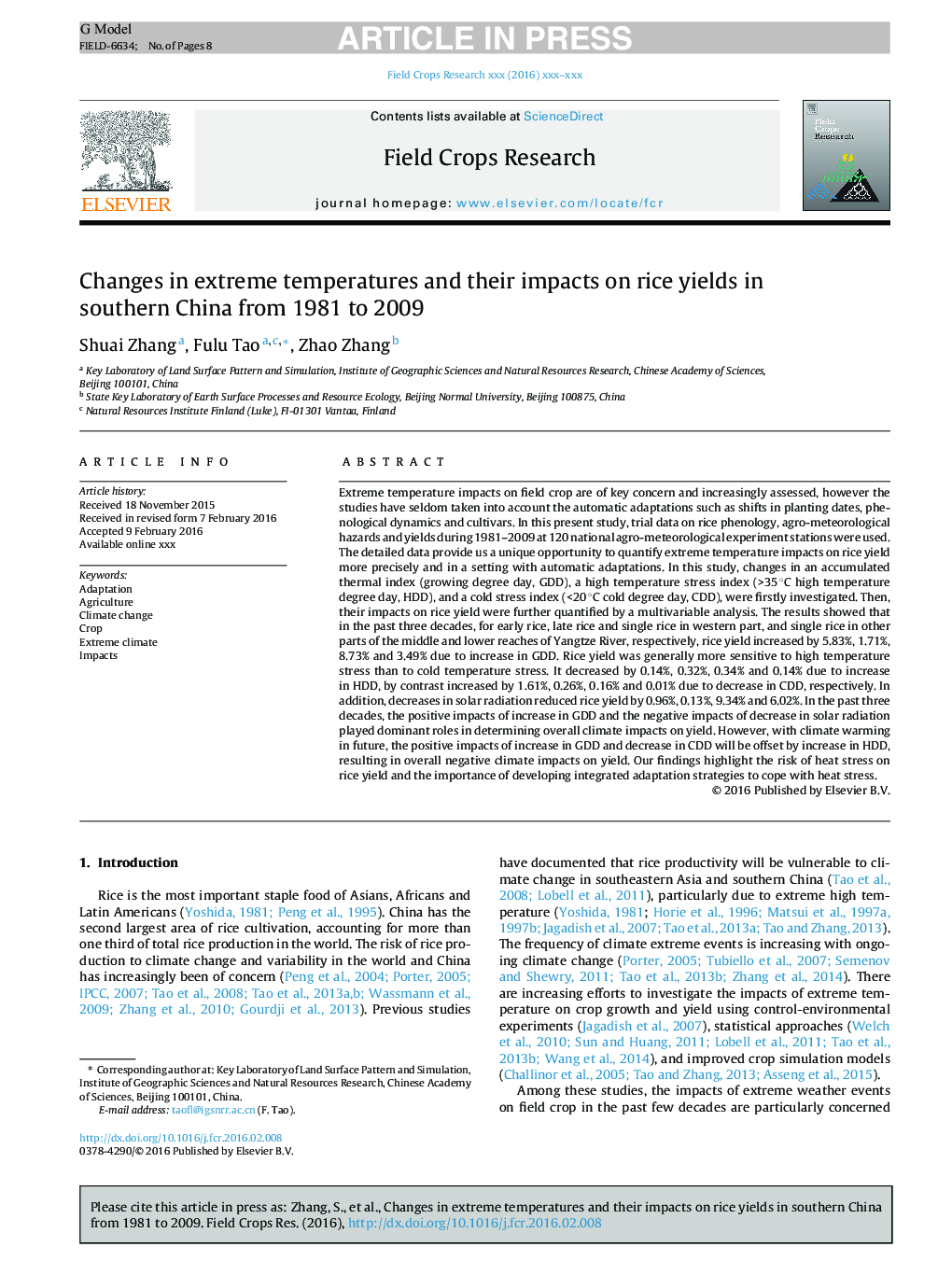| کد مقاله | کد نشریه | سال انتشار | مقاله انگلیسی | نسخه تمام متن |
|---|---|---|---|---|
| 6374619 | 1624674 | 2016 | 8 صفحه PDF | دانلود رایگان |
عنوان انگلیسی مقاله ISI
Changes in extreme temperatures and their impacts on rice yields in southern China from 1981 to 2009
ترجمه فارسی عنوان
تغییرات در دماهای شدید و تاثیرات آنها بر عملکرد برنج در جنوب چین از سالهای 1981 تا 2009
دانلود مقاله + سفارش ترجمه
دانلود مقاله ISI انگلیسی
رایگان برای ایرانیان
کلمات کلیدی
انطباق، کشاورزی، تغییر آب و هوا، محصول آب و هوای شدید، تأثیرات
موضوعات مرتبط
علوم زیستی و بیوفناوری
علوم کشاورزی و بیولوژیک
علوم زراعت و اصلاح نباتات
چکیده انگلیسی
Extreme temperature impacts on field crop are of key concern and increasingly assessed, however the studies have seldom taken into account the automatic adaptations such as shifts in planting dates, phenological dynamics and cultivars. In this present study, trial data on rice phenology, agro-meteorological hazards and yields during 1981-2009 at 120 national agro-meteorological experiment stations were used. The detailed data provide us a unique opportunity to quantify extreme temperature impacts on rice yield more precisely and in a setting with automatic adaptations. In this study, changes in an accumulated thermal index (growing degree day, GDD), a high temperature stress index (>35 °C high temperature degree day, HDD), and a cold stress index (<20 °C cold degree day, CDD), were firstly investigated. Then, their impacts on rice yield were further quantified by a multivariable analysis. The results showed that in the past three decades, for early rice, late rice and single rice in western part, and single rice in other parts of the middle and lower reaches of Yangtze River, respectively, rice yield increased by 5.83%, 1.71%, 8.73% and 3.49% due to increase in GDD. Rice yield was generally more sensitive to high temperature stress than to cold temperature stress. It decreased by 0.14%, 0.32%, 0.34% and 0.14% due to increase in HDD, by contrast increased by 1.61%, 0.26%, 0.16% and 0.01% due to decrease in CDD, respectively. In addition, decreases in solar radiation reduced rice yield by 0.96%, 0.13%, 9.34% and 6.02%. In the past three decades, the positive impacts of increase in GDD and the negative impacts of decrease in solar radiation played dominant roles in determining overall climate impacts on yield. However, with climate warming in future, the positive impacts of increase in GDD and decrease in CDD will be offset by increase in HDD, resulting in overall negative climate impacts on yield. Our findings highlight the risk of heat stress on rice yield and the importance of developing integrated adaptation strategies to cope with heat stress.
ناشر
Database: Elsevier - ScienceDirect (ساینس دایرکت)
Journal: Field Crops Research - Volume 189, 15 March 2016, Pages 43-50
Journal: Field Crops Research - Volume 189, 15 March 2016, Pages 43-50
نویسندگان
Shuai Zhang, Fulu Tao, Zhao Zhang,
